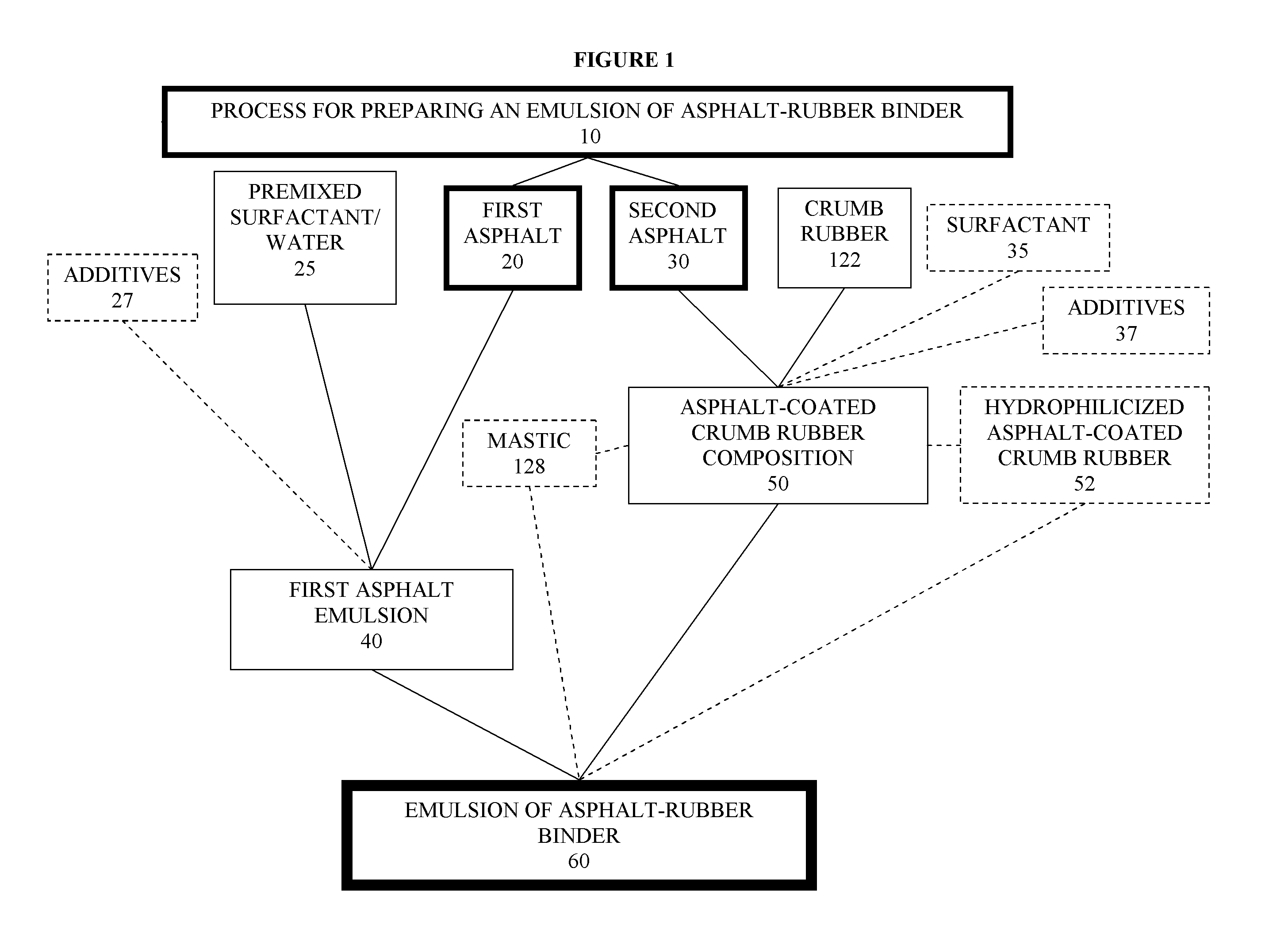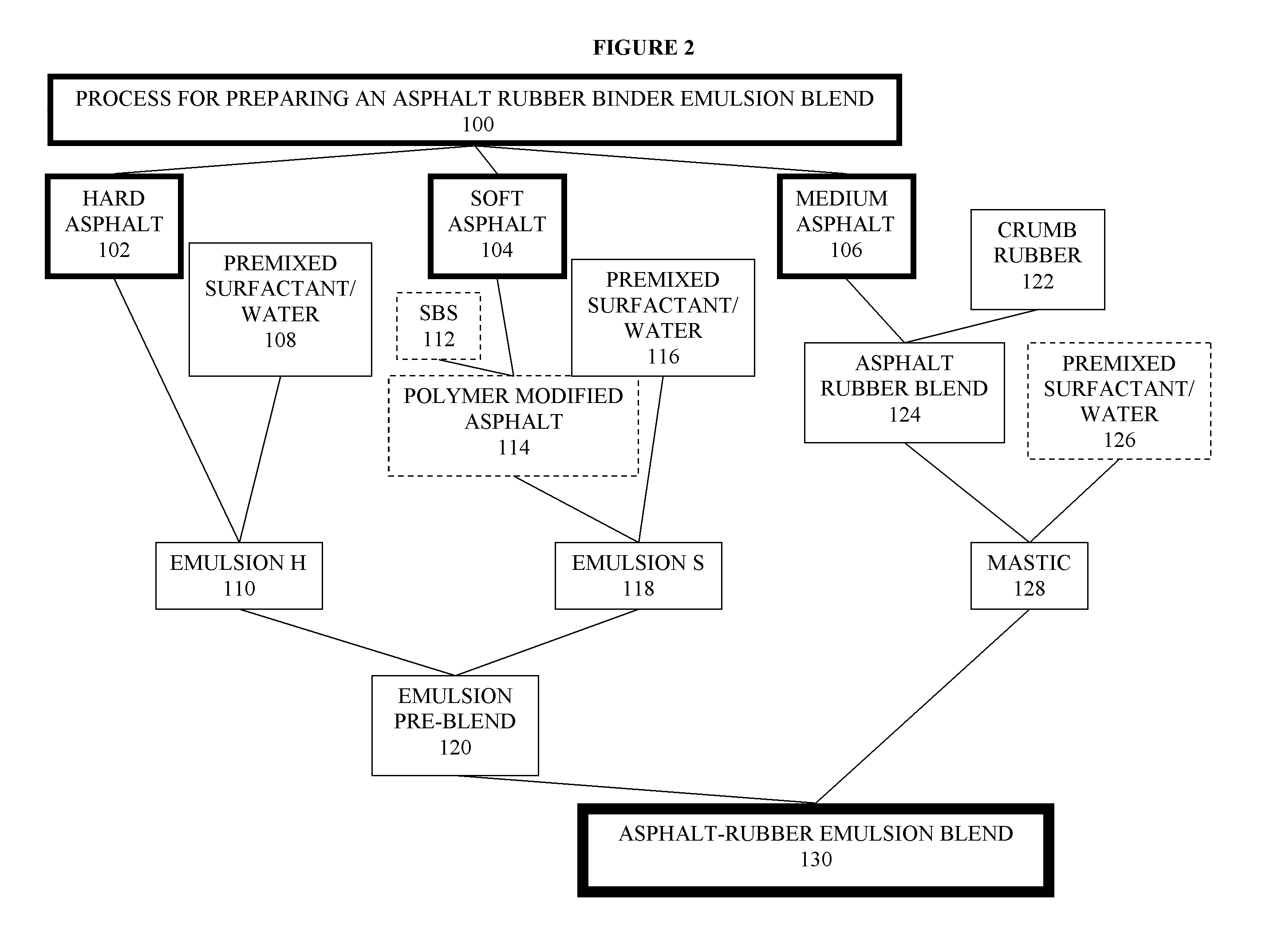Asphalt-rubber compositions and systems and methods for preparing same
a technology of asphalt and compositions, applied in the field of asphalt-rubber compositions and systems and methods for preparing same, can solve the problems of limiting road paving activities, crack oxidative hardening of asphalt pavement, etc., and achieves the effect of less temperature sensitive and easy application to road surfaces
- Summary
- Abstract
- Description
- Claims
- Application Information
AI Technical Summary
Benefits of technology
Problems solved by technology
Method used
Image
Examples
example 2
[0122]The procedure of Example 1 is carried out except that the preparation of Composition A-Crumb rubber concentrate, is modified as follows.
Composition A—Crumb Rubber Concentrate
[0123]
TABLE 5Crumb Rubber Concentrate (Component #1)WeightElement(lbs)SolidsComments1) Asphalt60.560.5Typically AC5 (90-200pen; R&B = 85-100 F.)Raise #1 to 350 F. then add #2 and mix for ~15 minutes2) Crumb Rubber30.030.0Sub-total90.590.53) Ammendment4.04.0Epoxidized soy oil or otherfunctional vegetable oil derive.Cool blend of #1 + #2 + #3 to ~200 F., then thoroughly blend #4to achieve heavy mastic body consistency4) 48191.51.2Total9695.7
[0124]Table 5 summarizes one embodiment of the preparation of the crumb rubber concentrate. Asphalt (about 60.5 lbs, about 90-200 pen, ring and ball (R&B) softening temperature=about 85-100° F.) is heated to about 350° F. Crumb rubber (about 30 lbs, vulcanized ground scrap tire, about 650-75 micron range) is then added and the combination is mixed for about 15 minutes whe...
example 3
[0125]Composition B (about 45 wt %) and composition C (about 20 wt %) are thoroughly blended, composition A (about 35 wt %) is then added under high speed shear until the mixture is fully homogeneous. Finally, a crosslinker is added (1.0% SL4005 resin, as described in the product data sheet, available from PrimePlex, LLC).
example 4
Street and Highway Safety Seal
[0126]A crumb rubber concentrate is prepared as described in Example 2. The crumb rubber employed is a finely ground tire (80-140 mesh). A cationic emulsion is then prepared having a pH of about 2.5 to about 4.5 using the crumb rubber concentrate as described in Example 1 or Example 2. The emulsion is formulated to have about 50% to about 55% solids by distillation, about 15% to about 22% ground tire rubber, and have an viscosity of less than about 100 seconds.
[0127]The emulsion thus prepared is diluted by about 50% and sprayed on street or highway asphalt pavement at spread rates of about 0.10 gal / sq. yd.
[0128]The skid coefficient (per ASTM E274-06) and the wet surface locked wheel stopping distance of a treated road is compared to the skid coefficient of an untreated road for smooth round stone aged pavement, angular aged pavement, and new pavement. In every case, the skid coefficient and the stopping distance was significantly better for the treated ...
PUM
| Property | Measurement | Unit |
|---|---|---|
| temperature | aaaaa | aaaaa |
| temperature | aaaaa | aaaaa |
| diameter | aaaaa | aaaaa |
Abstract
Description
Claims
Application Information
 Login to View More
Login to View More - R&D
- Intellectual Property
- Life Sciences
- Materials
- Tech Scout
- Unparalleled Data Quality
- Higher Quality Content
- 60% Fewer Hallucinations
Browse by: Latest US Patents, China's latest patents, Technical Efficacy Thesaurus, Application Domain, Technology Topic, Popular Technical Reports.
© 2025 PatSnap. All rights reserved.Legal|Privacy policy|Modern Slavery Act Transparency Statement|Sitemap|About US| Contact US: help@patsnap.com


